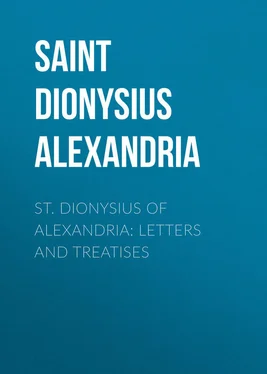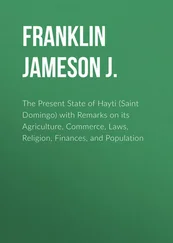Saint Dionysius of Alexandria - St. Dionysius of Alexandria - Letters and Treatises
Здесь есть возможность читать онлайн «Saint Dionysius of Alexandria - St. Dionysius of Alexandria - Letters and Treatises» — ознакомительный отрывок электронной книги совершенно бесплатно, а после прочтения отрывка купить полную версию. В некоторых случаях можно слушать аудио, скачать через торрент в формате fb2 и присутствует краткое содержание. Жанр: foreign_religion, foreign_antique, foreign_prose, на английском языке. Описание произведения, (предисловие) а так же отзывы посетителей доступны на портале библиотеки ЛибКат.
- Название:St. Dionysius of Alexandria: Letters and Treatises
- Автор:
- Жанр:
- Год:неизвестен
- ISBN:нет данных
- Рейтинг книги:5 / 5. Голосов: 1
-
Избранное:Добавить в избранное
- Отзывы:
-
Ваша оценка:
- 100
- 1
- 2
- 3
- 4
- 5
St. Dionysius of Alexandria: Letters and Treatises: краткое содержание, описание и аннотация
Предлагаем к чтению аннотацию, описание, краткое содержание или предисловие (зависит от того, что написал сам автор книги «St. Dionysius of Alexandria: Letters and Treatises»). Если вы не нашли необходимую информацию о книге — напишите в комментариях, мы постараемся отыскать её.
St. Dionysius of Alexandria: Letters and Treatises — читать онлайн ознакомительный отрывок
Ниже представлен текст книги, разбитый по страницам. Система сохранения места последней прочитанной страницы, позволяет с удобством читать онлайн бесплатно книгу «St. Dionysius of Alexandria: Letters and Treatises», без необходимости каждый раз заново искать на чём Вы остановились. Поставьте закладку, и сможете в любой момент перейти на страницу, на которой закончили чтение.
Интервал:
Закладка:
The following is an indication of Dionysius’s line of defence against the five points raised against him, other matters which arose more particularly between him and his namesake of Rome being passed over.
(1) As to the charge of separating the Three Persons in the Trinity, he distinctly denies it: all the language he employs and the very names he gives imply the opposite: “Father” must involve “Son” and “Son” “Father”: “Holy Spirit” at once suggests His Source and the Channel.
(2) As to the eternity of the Son, he is equally emphatic. God was always the Father and therefore Christ was always the Son, just as, if the sun were eternal, the daylight would also be eternal.
(3) The charge of omitting the Son in speaking of the Father and vice versa is refuted by what is said under (1): the one name involves the other.
(4) Dionysius’s rejection or non-employment of the term ὁμοούσιος is less easily disposed of. He practically acknowledges that, as it is not a Scriptural word, he had not used it, but at the same time that the figures he employed suggested a similar relationship, e. g. the figure of parent and child who are of one family (ὁμογενεῖς) or seed, root and plant which are of one kind (ὁμοφυῆ), and again source and stream, and in another place the word in the heart and the mind springing forth by the tongue (see p. 106 Конец ознакомительного фрагмента. Текст предоставлен ООО «ЛитРес». Прочитайте эту книгу целиком, купив полную легальную версию на ЛитРес. Безопасно оплатить книгу можно банковской картой Visa, MasterCard, Maestro, со счета мобильного телефона, с платежного терминала, в салоне МТС или Связной, через PayPal, WebMoney, Яндекс.Деньги, QIWI Кошелек, бонусными картами или другим удобным Вам способом.
): but for the unsatisfactoriness of this defence the reader should consult Bethune-Baker, Early History of Christian Doctrine , chap. viii. pp. 113 ff, who points out that Dionysius had not grasped the Western tradition of one substantia (οὐσία) of Godhead existing in three Persons.
(5) But the most serious misunderstanding naturally arose from Dionysius speaking of the Son as ποίημα (creature), and illustrating the word by the gardener with his vine and the shipwright with his boat. His defence is that though he had undoubtedly used such rather unsuitable figures somewhat casually, he had immediately adduced several others more suitable and apposite (such as those mentioned under (4) above). And he complains that not only here, but throughout, his accusers did not take his utterances as a whole, but slashed his writings about and made what sense of them they liked, not sincerely, but with evil intent. He tries further to explain that in his context ποιεῖν (make) was equivalent to γεννᾶν (beget), as of a Father, not a Creator, which he maintains is legitimate, but the defence is not very convincing all the same.
So far as we can now judge, however, his arguments seem to have satisfied his critics at the time, and were certainly held in high repute by the ancient Churches, for they are quoted or referred to not only by Athanasius, as has been stated, but also by Eusebius, by Basil of Cæsarea (who is, however, much more temperate in his support), and by Jerome and Rufinus.
Dionysius’s Last Days
17. It is evident that, in spite of this controversy, his great reputation in the eyes of the Church was maintained to the end: for when the Council of Antioch was being summoned to deal with the troubles connected with the heresies of Paul of Samosata, who held views somewhat similar to those of Sabellius, Dionysius was specially invited to attend. As was said above on p. 10 2. The references to his family and early years are extremely scanty and vague. In the Chronicon Orientale , p. 94, he is stated to have been a Sabaita and sprung from “the chiefs and nobles of that race”: and several writers speak as if he had been a rhetorician before his conversion (as Cyprian of Carthage had been). The exact meaning of the term “Sabaita” above is doubtful. Strictly used, it should mean a member of the Sabaite convent near Jerusalem, and the Chronicon may be claiming Dionysius as that, though, of course, without any ground for the claim. If it is equivalent, however, to “Sabæan” here, it implies an Arab descent for him, which is hardly probable, as he seems always to consider himself connected by education and residence, if not by birth, with the city-folk of Alexandria, whom he distinguishes from the Coptic inhabitants of Egypt (Αἰγύπτιοι); so that it would be rather surprising to find that his family came from the remoter parts of Arabia, where the Sabæans dwelt. The other tradition of his having been a rhetorician may be due to some confusion between our Dionysius and a much later Alexandrian writer of the same name, who edited the works of the Areopagite with notes and wrote other treatises. On the other hand, Dionysius’s literary style is such that it might very well have been formed by the study and practice of rhetoric, while he has been thought himself to corroborate the statement of the Chronicon Orientale , as to the high position of his family, in his reply to Germanus ( p. 49 Конец ознакомительного фрагмента. Текст предоставлен ООО «ЛитРес». Прочитайте эту книгу целиком, купив полную легальную версию на ЛитРес. Безопасно оплатить книгу можно банковской картой Visa, MasterCard, Maestro, со счета мобильного телефона, с платежного терминала, в салоне МТС или Связной, через PayPal, WebMoney, Яндекс.Деньги, QIWI Кошелек, бонусными картами или другим удобным Вам способом. ), where he refers to the “losses of dignities” which he has suffered for the Faith. 3. He was probably a priest, and not less than thirty, when he became head of the Catechetical School in 231, and in 264 he excused himself from attendance at the Council of Antioch on the ground of age and infirmity; and so it is a safe inference that he was born about or before 200, being thus nearly of an age with Cyprian of Carthage, and only ten or fifteen years younger than Origen, his master.
, he excused himself from attendance on the ground of old age and infirmity, but he sent a letter in reply to the invitation which contained his views on the matter, and these were unfavourable to the heretic. In 265, before the Council had finished its sessions, he passed to his well-earned rest.
Dionysius as Author
18. From what has already been said, it will be gathered that Dionysius was a person of remarkable versatility, and at the same time unusually free from those snares of the versatile man, shallowness and inaccuracy. The critical remarks on the Revelation of S. John the Divine from his treatise On the Promises (περὶ Ἐπαγγελιῶν), which are given in full (from Eusebius) on pp. 82 ff. Конец ознакомительного фрагмента. Текст предоставлен ООО «ЛитРес». Прочитайте эту книгу целиком, купив полную легальную версию на ЛитРес. Безопасно оплатить книгу можно банковской картой Visa, MasterCard, Maestro, со счета мобильного телефона, с платежного терминала, в салоне МТС или Связной, через PayPal, WebMoney, Яндекс.Деньги, QIWI Кошелек, бонусными картами или другим удобным Вам способом.
, have received the most respectful consideration from such authorities as Bishop Westcott and Dr. Swete and are well worth reading, while some of the expositions of Biblical passages attributed to him are probably genuine and by no means destitute of merit, though none of them are printed in this volume.
Интервал:
Закладка:
Похожие книги на «St. Dionysius of Alexandria: Letters and Treatises»
Представляем Вашему вниманию похожие книги на «St. Dionysius of Alexandria: Letters and Treatises» списком для выбора. Мы отобрали схожую по названию и смыслу литературу в надежде предоставить читателям больше вариантов отыскать новые, интересные, ещё непрочитанные произведения.
Обсуждение, отзывы о книге «St. Dionysius of Alexandria: Letters and Treatises» и просто собственные мнения читателей. Оставьте ваши комментарии, напишите, что Вы думаете о произведении, его смысле или главных героях. Укажите что конкретно понравилось, а что нет, и почему Вы так считаете.












